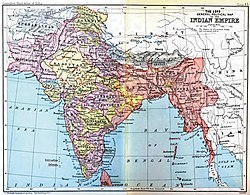Portuguese East India Company

Coat of Arms of Portuguese India
|
|
| Industry | International trade |
|---|---|
| Fate | Dissolved |
| Successor | Casa da Índia |
| Founded | August 1628 |
| Defunct | 1633 |
| Headquarters | Ribeira Palace |
|
Area served
|
Portuguese Empire |
|
Key people
|
Philip III of Portugal |

Imperial entities of India
|
|
| Dutch India | 1605–1825 |
|---|---|
| Danish India | 1620–1869 |
| French India | 1769–1954 |
|
|
|
| Casa da Índia | 1434–1833 |
| Portuguese East India Company | 1628–1633 |
|
|
|
| East India Company | 1612–1757 |
| Company rule in India | 1757–1858 |
| British Raj | 1858–1947 |
| British rule in Burma | 1824–1948 |
| Princely states | 1721–1949 |
| Partition of India |
1947
|
|
|
|
The Portuguese East India Company (Portuguese: Companhia do commércio da Índia or Companhia da Índia Oriental ) was a short-lived ill-fated attempt by Philip III of Portugal to create a national chartered company to look after interests in Portuguese India in the face on encroachment by the Dutch and English following the personal union of the Portuguese and Spanish Crowns.
Portuguese trade with India had been a crown monopoly since the Portuguese captain Vasco da Gama opened the sea route to India in 1497-99. The monopoly had been managed by the Casa da Índia, the royal trading house founded around 1500. The Casa was responsible for the yearly India armadas. However, by 1560, the Casa's finances were in dire straits and in 1570, King Sebastian of Portugal issued a decree opening up trade to India to any private Portuguese national. As few took up the offer, the free trade decree was replaced in 1578 by a new system of annual monopolies, where the Casa sold India trading contracts to a private Portuguese merchant consortium, granting them a monopoly for one year. This annual contract system was abandoned in 1597, and the royal monopoly resumed.
The Iberian Union of 1580, which gave King Philip II of Spain the crown of Portugal, changed little at first. But the vigorous Dutch VOC and English EIC encroachments on the Portuguese empire and trade in Asia after 1598 forced the king to experiment with different arrangements to defend the Portuguese positions. In 1605, he created the Conselho da Índia, to bring affairs in Portuguese India under closer supervision of the Habsburg crown. But this conflicted with older lines of Portuguese authority, and the council was eventually dissolved in 1614.
...
Wikipedia
